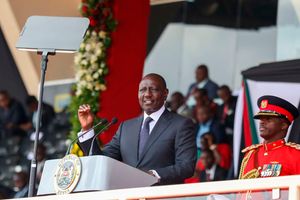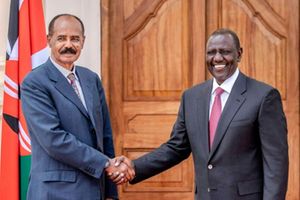Premium
On Finance Bill 2024 proposals, CS Mbadi is walking a tight fiscal rope

Treasury CS John Mbadi.
Treasury CS John Mbadi is not in a very enviable position. The former Suba South MP must be burning midnight oil to skilfully reintroduce the much vilified and repealed 2024/2025 Finance Bill with a fresh breath of legitimacy.
The CS, an accomplished accountant with impeccable credentials and relevant experience, and a seasoned legislator, promised Kenyans that he was going to deal decisively with the high cost of living that was fast reducing Kenyans to paupers. So, Kenyans are eagerly awaiting from Mbadi a more people-friendly budget that will enhance their welfare by eliminating taxation measures that have been mercilessly raiding their already battered pockets.
During his parliamentary vetting, Hon Mbadi wowed the country with his eloquence and accurate diagnosis of what was ailing the Kenyan economy. Therefore, Kenyans do not doubt Mbadi's ability, focus and determination to make life more bearable. After all, the CS has already undertaken to reboot the economy within one year. That is the easier part.
As CS Mbadi may have realised, Kenya is literally in the red zone on most of the critical macroeconomic indicators. The country is technically on the verge of insolvency. As of December 2023, the public debt had surpassed the National Assembly-imposed debt ceiling of Sh10 trillion by Sh100 billion, making the excess debt unprotected by law. Parliament moved fast to rectify this illegality by creating a "Debt Anchor" at 55 per cent of the Gross Domestic Product (GDP). The meddling with public debt ceilings is an indicator that things are not rosy on the fiscal side of the economy. Contrary to popular belief, Kenyans are not some of the most taxed people in the world. Kenya's Tax to GDP ratio is 15.8% (Financial Year 2023/2024); it was projected to move up slightly to 16.2% had the Finance Bill 2024/2025 not been repealed. Compared to an average of 34.0% for OECD countries, Kenya is still grossly under-taxed despite its high revenue potential. The relatively low domestic revenue mobilisation capacity imposes impediments on the government's effort towards modernisation of the economy. The result is an economy that does not offer a conducive environment for the private sector to increase its production. With low production, revenue generation in the economy is therefore, grossly compromised. It is a vicious circle in which poor tax collection leads to low capacity to generate adequate financial resources to underwrite development and recurrent expenditures.
The Kenya Revenue Authority is struggling to meet its revenue targets. For example, in the Financial Year 2023/2024, KRA collected a total of Sh2.4 trillion in ordinary revenue (VAT, income tax, customs duty, excise duty) against a target of Sh2.6 trillion. This represents a deficit of Sh200 billion. This year, the tax collector envisages a bigger revenue shortfall due to the Gen-Z demonstrations that disrupted economic activities. Typically, with such a gloomy picture on the ordinary revenue side, additional public debt would have been the option to close deficit in budget financing. Unfortunately, Kenya is no longer attractive to lenders. The global credit ratings agency S&P has since downgraded Kenya's rating from "B" to "B-" following the repeal of the 2024/2025 Finance Bill, citing the likelihood of slowing down of fiscal consolidation. In these circumstances, the country will be hard put to access concessionary loans, which are usually cheaper. The options are syndicated (commercial) loans, and sovereign debt instruments that are harshly priced in favour of the lenders. Kenya can hardly afford more foreign debt at a time when the Auditor General is accusing the National Treasury of resisting full disclosure of the country's total debt portfolio, thus raising suspicions about the existence of 'phantom debts' in Kenya's debt books.
The foregoing is the grim macroeconomic situation that CS Mbadi inherited from his predecessor, Prof Njuguna Ndung'u. John Mbadi has literally been thrown into the deep end of an economic sea with vicious waves. How he navigates the waves safely to the shores will determine whether the promises he made to Kenyans during his parliamentary vetting will come to fruition.
Looking critically at the repealed 2024/2025 Finance Bill, save for a few outlandish taxation measures such as VAT on bread and motor vehicle tax, one deciphers a genuine effort by the government to raise adequate domestic financial resources to address the economic situation. Most of the taxation measures in the repealed 2024/2025 Finance Bill were realistic given the need to get the country out of the debt distress that it had been driven to over more than a decade of sustained fiscal indiscipline.
John Mbadi must stand his ground to avoid throwing out the baby with the bath water. All the beautiful provisions in that Finance Bill must be protected. Besides, it must be emphasised that for Mbadi, the question is not whether to tax Kenyans, but, rather, how to tax them to provide public goods. As Kenyans, we should appreciate that the social contract between the leaders and the citizens is only tenable if each side performs their civic duty. Citizens should pay equitable taxes for them to demand services, and the leaders must utilise citizens' taxes with utmost responsibility and accountability.
The problem with the current situation in Kenya is that the 2024/2025 Finance Bill was bastardised by Gen-Z, politicians and citizens, most of whom did not even read it. So, Mbadi's team must see the greatest challenge facing them as more of a legitimacy crisis than a technical one. The question then is: how can John Mbadi effectively manage the problem of lack of legitimacy of the Finance Bill? The Treasury must quickly divide the problem into short-term and long-term issues. The short-term issues have to do with identifying the key stakeholders who were influencers in the rejection of the Bill and throw it to them to identify the problem areas. The time-tested approach is to work with them on a sectoral basis to address all the issues. The Treasury, KRA and Parliamentary Budget Office should work with them to fine-tune the issues. Once they own the new document, they form a critical mass of supporters around it. The other thing is to ensure that no additional taxes are introduced on basic commodities that are consumed by low-income Kenyans.
Last but not least, the budget must protect the productive sectors including manufacturing, construction and agriculture. These are the sectors that will help Mbadi to create the jobs that Kenyans are asking for. The productive sectors cannot be boosted if they cannot access adequate credit from the financial sector. In this regard, Mbadi must tame the run-away appetite for domestic debt. Usually, the bulk of domestic debt to the government comes from the Central Bank of Kenya through open market operations. This entails increasing interest rates to make treasury bills and bonds attractive to investors. In the process, the private sector lenders are 'crowded out' since banks and other financial institutions may not afford to pay high interest rates on customer deposits. Besides, a general increase in interest rates in the economy discourages borrowing as the businesses may not make enough profits to repay the loans and remain afloat.
In the long run, the government should continue to support the modernisation of KRA to consolidate the gains already made with respect to use of technology for intelligent tax administration, ensure quality training of staff, reducing lethargy in internal processes, minimising revenue leakages, and addressing governance issues. The Treasury should also seek the concurrence of Parliament to create a Fiscal Policy Committee to provide relevant advisory to CS on continuous basis. The rest of the business should revolve around evoking patriotism among Kenyans, and asking them to join the government in providing innovative ideas to help manage the economy for shared prosperity. Mbadi should tell Kenyans the truth about the macroeconomic situation that he has inherited. If he falls into the trap of making lofty promises that the economy cannot deliver on in the short run, then Kenyans will soon return to the streets.
Professor Ongore teaches at the Technical University of Kenya. He is a former Chief Manager at Kenya Revenue Authority. [email protected]




